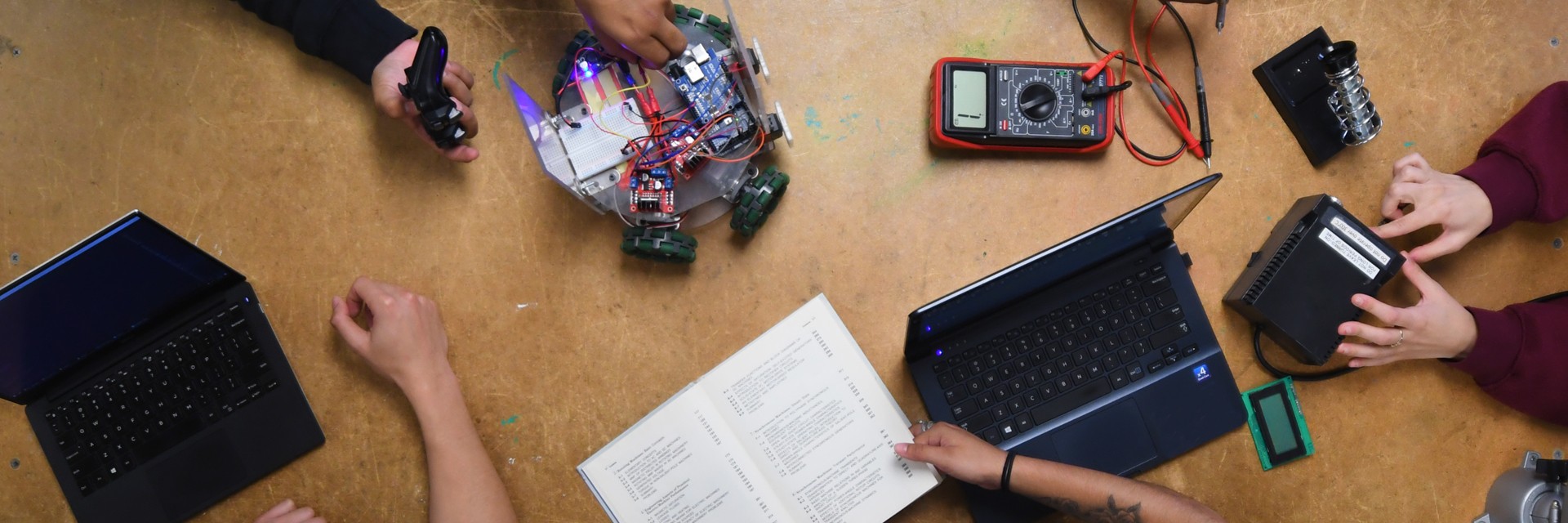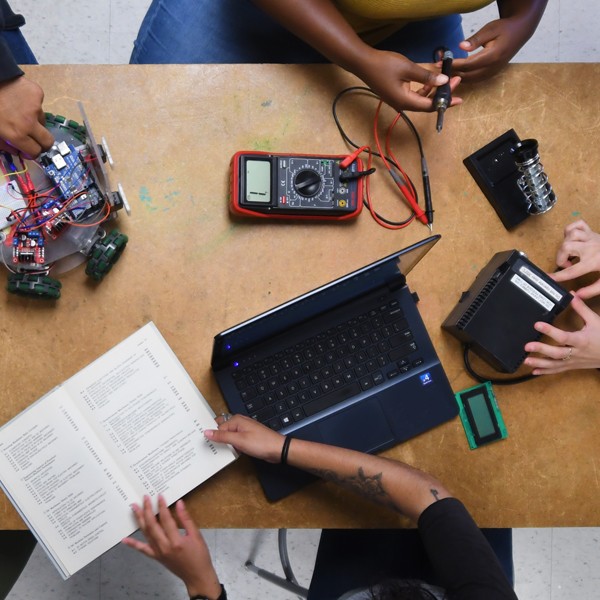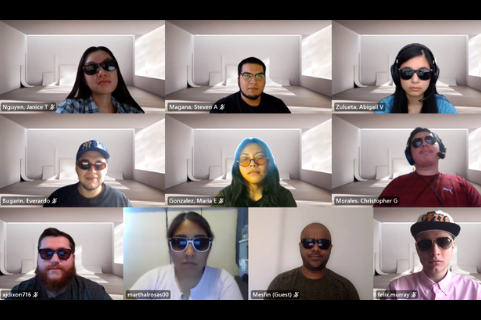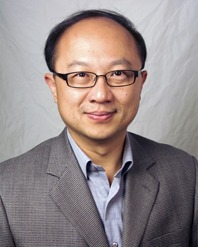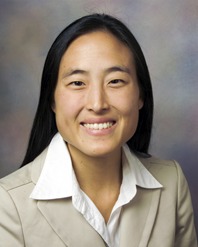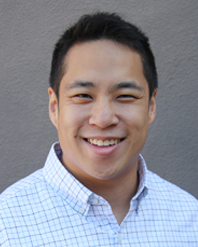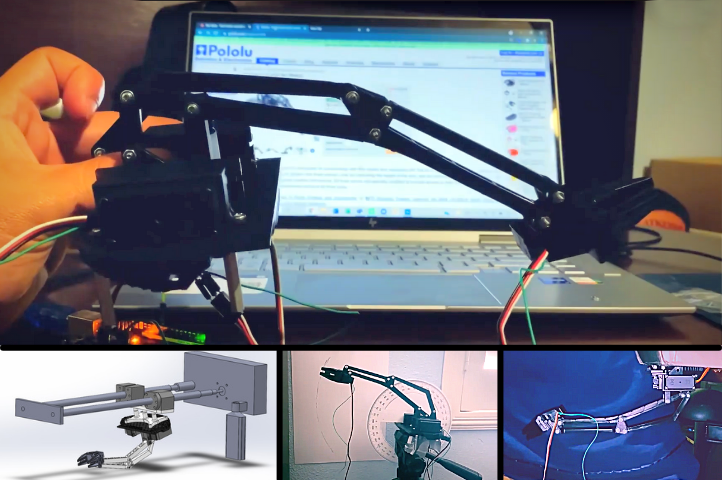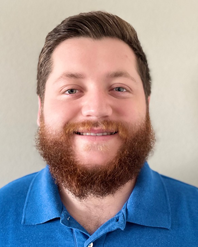Photo: Interns wearing fun sunglasses during a meeting.
The transition of California community college students to four-year universities can be challenging, especially for students interested in pursuing STEM degrees and careers. To help address the problem, in the summer of 2021, ECST’s Electrical and Computer Engineering (ECE) Department partnered with Growth Sector’s STEM Core Program and the BE WINNORS Program funded by Xilinx to pilot a program offering 10-week summer internships on campus and remotely to community college students.
Growth Sector is a nonprofit focused on ensuring that community college students are prepared for the academic rigor of earning STEM undergraduate degrees by encouraging community colleges to implement STEM Core, a cohort-based, one-year program with an emphasis on math. The BE WINNORS program provides opportunities for student interns to apply their STEM education to conducting research in an academic environment.
Growth Sector is a nonprofit focused on ensuring that community college students are prepared for the academic rigor of earning STEM undergraduate degrees.
The combination is powerful. Growth Sector pre-screens prospective STEM Core interns to ensure they have basic math and analytical skills. The BE WINNORS program offers interns real-world research and engineering challenges to work on. The ECST ECE Department pairs students with faculty and peer mentors who provide help to ensure interns make meaningful contributions and get integrated into the college experience.
All three organizations are aligned around the goal of ensuring student success and increasing diversity in the STEM workforce.
Photo: Dr. Charles Liu, Dr. Deborah Won, Dr. Curtis Wang
Instrumental in the internship pilot program were three ECE faculty: ECE Department Chair and Professor Charles W. Liu, Professor Deborah Won, a biomedical engineering specialist, and Assistant Professor Curtis Wang, a computer engineering and biomedical engineering specialist. Professor Liu headed up the career development subgroup and recruited faculty mentors. Professor Won took the lead on the BE WINNORS research project. Professor Wang oversaw the website development project.
“We’ve wanted for quite a while to reach out to community college transfer students to help them grow and make the transition to a four-year university,” says Dr. Won. “The transfer system is a good one that generally works well. But transfer students can feel left out. It’s a big thing for them to make the transition.”
Says Dr. Wang, “The pilot program showed that we can fill a gap for transfer students by creating a supportive peer environment that can help them succeed.”
The pilot program showed that we can fill a gap for transfer students by creating a supportive peer environment that can help them succeed.
Last summer’s pilot program accepted five students: three men and two women, three students of color, four students from Southern California community colleges, and one student from a Northern California community college. All the interns participated in career development activities, including interviewing ECST Electrical Engineering alumni working in industry. For the research component of the internship, students chose between a website development project for Cal State LA’s Art Department and a BE WINNORS design challenge of building a prototype for a shower assistant robotic arm for individuals with a disability that constrains their movements. For the latter, interns could work on the design of the arm itself or a computer vision component that would enable the arm to detect an individual’s head and shoulders and position itself correctly.
“One of the interns had emigrated to the U.S. He was shy, and did not feel super comfortable with his English,” says Dr. Wang. “During his interview, he was very nervous, and his internet wasn’t great, so he kept cutting in and out. He was someone who we decided, you can’t judge a book by its cover. He ended up being one of the ideal students for the project. He was very motivated and once he got a task, he followed it all the way through. He ended up being the student leader for the website development team. He really stepped up.”
Added Dr. Wang, “There was another intern who didn’t have internet access at home, so she did her entire internship from a McDonald’s near her home. That is how motivated these students were.”
Says Dr. Won, “Another intern, Aaron Dixon, also was a great story. It was clear that he loved making things. He would do woodworking and metalworking projects at home. We wondered how he would do with computer design, but he jumped right in. If there was a task and no one volunteered, he would just get in there and take care of it.”
When Dixon was accepted into the summer internship pilot program, he was a student at Santa Ana Community College. He had not yet made decisions about which four-year college he would attend or what he would major in. During the internship, he chose to work on the design of the BE WINNORS robotic arm. Inspired by his summer experience, Dixon chose to transfer to Cal State LA and is now majoring in Mechanical Engineering with the goal of pursuing his new-found interest in robotics and specifically biomedical systems. He also serves as a mentor to other community college students through another program at ECST.
Photo: Robot hand project seen in various stages.
The internship showed me that I want to work on meaningful projects that have a positive impact on people’s lives. It bridged together all the classes I’d been taking in community college.
The three-way collaboration on last summer’s internship program was so successful that Professor Liu was able to secure funding to increase the number of students and ECST faculty members involved in the program. This summer, the program will accept 25-30 interns and potentially add faculty mentors from ECST’s Mechanical Engineering Department.
When asked what advice he’d give to other community college students making the transition to four-year universities, Dixon says, “Take advantage of every opportunity that you can. You don’t know what you like until you do it. Without the summer internship at ECST, I wouldn’t be the student or the role model that I am.”
